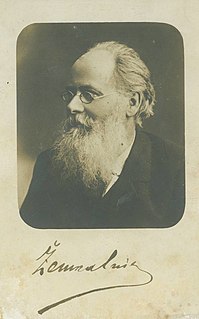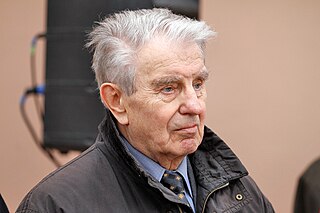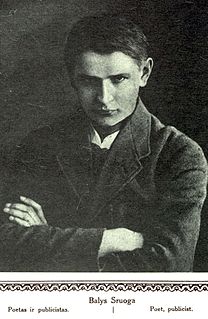 W
WVytautas Alantas was a Lithuanian writer, journalist, and political ideologue. Educated in France, Alantas worked as a journalist of the Lithuanian news agency ELTA and chief editor of the official daily Lietuvos aidas. Alantas was one of the leaders of Young Tautininkai, an organization of radical young members of the Lithuanian Nationalist Union in the late 1930s – this movement is also known as Vairininkai after the political magazine Vairas. A sympathizer with national socialism, Alantas is considered to be one of the chief ideologues of totalitarian nationalism in interwar Lithuania. During the Nazi occupation of Lithuania, he participated in the Lithuanian Activist Front (LAF) and later emigrated to the United States where he dedicated his life to literary work. He was a prolific writer and published seven collections of short stories, six novels, fifteen plays, four non-fiction books, and one poetry collection. His writings primarily deal with patriotic themes and topics.
 W
WAlbertas Juozėnas, mostly known by his pseudonym Juozas Baltušis was a Soviet Lithuanian writer, radio and press operative and public figure. A popular author in Lithuania, albeit with a strong Soviet identity, among his best known works are the 1947 play Gieda gaideliai, the novel Parduotos vasaros, first published in two volumes in 1957 and 1969 and Sakmė apie Juzą, a 1979 universal piece of literature which won the Lithuanian SSR State Prize and the Prix du Meilleur Livre Étranger. From 1946 to 1954 he was the secretary of the party organization of the Lithuanian Writers' Union and from 1946 to 1954 and then 1958 until 1962 he worked as the editor-in-chief of the literary magazine Pergalė (Victory). He was the deputy of the Supreme Council of the Lithuanian SSR for several decades.
 W
WKazys Binkis was a Lithuanian poet, journalist, and playwright. He used the pseudonyms K. Alijošius, K. Papilietis, Kazys, Kazys Roviejietis, Nedarbininkas, Neklaipėdietis, Nelatvis, Nepartyvis, Ras Desta, Riza Chanas, and others.
 W
WAleksandras Fromas known by his pen name Gužutis (1822–1900) was a Lithuanian writer, one of the first authors of Lithuanian plays and dramas.
 W
WJuozas Glinskis is a Lithuanian playwright.
 W
WButkų Juzė was the pen name of Juozas Butkus, a Lithuanian educator, poet, playwright and journalist. He worked for numerous newspapers from 1910 onwards, including Aušrinė, Žemaitis, Lietuvos žinios, and Naujojoje Lietuvoje. In 1932 he was inducted into the Lithuanian Journalists' Union. He wrote the play Palaidūnas (Prodigal) in 1925, and translated numerous works into Lithuanian, including Goethe's Egmont. He later worked as a museum curator and teacher at the Klaipėda Pedagogical Institute.
 W
WVincas Mickevičius, better known by his pen name Vincas Krėvė-Mickevičius, was a Lithuanian writer, poet, novelist, playwright and philologist. He is also known as Vincas Krėvė, the shortened name he used in the United States.
 W
WSofija Čiurlionienė née Kymantaitė (1886–1958) was a Lithuanian writer, educator, and activist.
 W
WGabrielius Landsbergis-Žemkalnis (1852–1916) was a Lithuanian playwright and activists of the early Lithuanian amateur theater.
 W
WJustinas Marcinkevičius was a prominent Lithuanian poet and playwright.
 W
WOscar Vladislas de Lubicz Milosz was a French language poet, playwright, novelist, essayist and representative of Lithuania at the League of Nations. His literary career began at the end of the nineteenth century during la Belle Époque and reached its high point in the mid-1920s with the books Ars Magna and Les Arcanes, in which he developed a highly personal and dense Christian cosmogony comparable to that of Dante in The Divine Comedy and John Milton in Paradise Lost. A solitary and unique twentieth-century metaphysician, his poems are visionary and often tormented. He was a distant cousin of Polish writer Czesław Miłosz, winner of the Nobel Prize for literature in 1980.
 W
WBalys Sruoga was a Lithuanian poet, playwright, critic, and literary theorist.